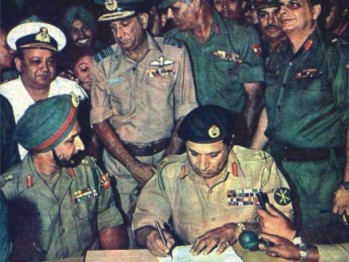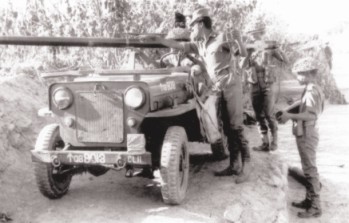Special Feature
Forgotten Friends
From India to Edward Kennedy, many nations and individuals had helped Bangladesh during its War of Liberation. Thirty-eight years after its independence, the country is yet to recognise many of its friends who helped its cause at a time when help was badly needed.
Ahmede Hussain
On a dark night of 1962 Bangabandhu Sheikh Mujibur Rahman, befooling the Pakistani border security guards, crossed the India-Pakistan border at Comilla. Bangabandhu was arrested by the members of the Border Security Force (BSF), and was taken to the nearby police station. Mujib made a call to the District Magistrate (DM) and told him that a plane was supposed to be waiting for him at the airport to take him to Delhi. Throughout 1962, Mujib had been secretly talking to the Indian government officials at the country's Deputy High Commission in Dhaka. Masterminded by Bangabandhu himself, the plan was for the independence of East Pakistan-- Bengali officers and jawans of the Pakistan Army and East Pakistan Rifles would lead an armed uprising to liberate the country from Pakistan; Awami League was going to be at the forefront of the struggle. Bangabandhu secretly crossed the border on January 27 in the hope of going to Delhi to put his plan before the Indian premier. Unaware of Mujib's visit, the DM at Agartala told Bangabandhu to go back home as neither the Deputy High Commission nor Delhi had informed him of Mujib's sojourn. Mujib was dropped near the border, where he sneaked into Comilla again. Six years later, the Pakistan government charged Mujib with sedition, saying that he had hatched a conspiracy in Agartala to create a separate nation.

Indira Gandhi |
In fact, Indian hand in Bangladesh's independence can be traced back as far away as 1962. The country was closely watching the political developments on its eastern frontier, and when the Pakistan Army launched Operation Searchlight on the night of March 25, 1971, India was quick to react. From the morning of March 26, Indian government-run radio station Akashbani stopped their regular programmes and repeatedly announced the news of the massacre in Dhaka: "'Civil war has started in East Pakistan,' it declared," says Abul Fateh who tuned into the station at 12 in the morning that day, "it was so reassuring to hear the news amidst the death and destruction."
More reassuring was the song that followed the news snippets. At the dawn of the darkest of night in the history of the Bengali nation Akashbani played Amar Shonar Bangla, Ami Tomae Bhalobashi (My Golden Bengal, I adore you), which later became Bangladesh's national anthem. "We were overjoyed. This one song has given us courage, hope and the dream to fight on," Abul says.
On March 27, Tajuddin Ahmed and other leaders of the Awami League crossed the border and were received with due honour by the BSF. They met the then Indian Prime Minister Indira Gandhi in Delhi. Tajuddin was assured of all help that his fledgling nation needed. “We had Mujib's declaration…Zia's declaration on independence. When the refugees started coming in, I was standing on the border… they were in a very shocking state. Soon we started getting more and more refugees and the government of India decided that we should help the Muktibahini, the freedom fighters,” says Lt Gen (rtd) JFR Jacob, former chief of the Indian Army.
Two days after Tajuddin's arrival, Indira Gandhi declared that India would open its border and welcome Bengali refugees to its soil. "It was an unprecedented decision, for countries usually close its borders when refugees pour in," says Shahriar Kabir, who is researching on India's involvement in Bangladesh's Liberation War.
 On March 31, Indira Gandhi herself moved a resolution in the parliament, which went: "The House records its profound conviction that the historic upsurge of the 75 million people of East Pakistan will triumph. The House wishes to assure them that their struggle and sacrifices will receive the wholehearted sympathy and support of the people of India." On March 31, Indira Gandhi herself moved a resolution in the parliament, which went: "The House records its profound conviction that the historic upsurge of the 75 million people of East Pakistan will triumph. The House wishes to assure them that their struggle and sacrifices will receive the wholehearted sympathy and support of the people of India."
Indian help increased as the number of refugees flooded Salt Lake and Agartala. In the first week of April India had started arming the freedom fighters, it got a momentum after the Bangladesh government in exile was formed on April 17 in Mujibnagar, Meherpur. Not only that India also sent its own troops in guise of freedom fighters to fight for the cause of Bangladesh, long before it formally recognised Bangladesh's sovereignty. "Officially," says Kabir, "India joined the war on December 3. But India had always sent its own army men to East Pakistan to fight alongside the Muktijoddhas." In fact, on May 15, the Indian Army launched an operation codenamed 'Operation Jackpot'. It coordinated 30,000 regular soldiers and 100,000 guerrillas who effectively destroyed the infrastructure of the Pakistan Army.
Even though Lt Gen Jacob puts Indian death toll at 1,400; unofficially, Kabir says, it could be as high as 20,000. "Pakistan Army arrested many Indian soldiers in March-November and paraded them before TV cameras," says Kabir, "and all of them were Indian jawans who infiltrated into East Pakistan to fight for Bangladesh." On the diplomatic front Bangladesh got a huge boost thanks again to a whirlwind tour that Indira Gandhi had made to the Western European capitals. By the time her trip was over, Bangladesh had the support of the people of Britain, France, Germany and Austria by its side.
The Soviet Union and its friends, meanwhile, supplied the Muktibahini with arms and military logistics and in mid November the combined strength of the freedom fighters stood at 1,49,000 compared to Pakistani strength of 85,000. At the fag end of the Bangladesh War, the Soviets vetoed thrice at the United Nations against proposals opposing Bangladesh's independence. 
US Senator Edward Kennedy, Congressman Cornelius Edward Gallagher played a crucial role in creating opinion in favour of Bangladesh; singers Ravi Shankar, George Harrison and Joan Boaz staged the famous Concert for Bangladesh to raise funds for Bangladeshi refugees; French author André Malraux championed Bangladesh's cause across Europe. But Indians beat them all: in 1971, Indian actress Waheeda Rahman, famous for her roles in 'Kaagaz Ke Phool' and 'Sahib Bibi Aur Ghulam', donated signing money of all her films to Bangladesh Shohaok Samiti (Bangladesh Assistance Association), Oscar-winning director Satyajit Ray raised money for the organisation. Artist Maqbool Fida Hussain exhibited his works on the streets of Bombay and donated the earnings.
On December 3, sensing defeat, the Pakistan Army launched Operation Chengiz Khan, a pre-emptive air strike on Indian airbases in Amritsar, Ambala, Agra, Awantipur, Bikaner, Halwara, Jodhpur, Jaisalmer, Pathankot, Srinagar and Uttarlai. The operation ended miserably and only spelled disaster for the Pakistan Army both on its eastern and western wings-- India declared war on Pakistan; Bhutan recognised Bangladesh on December 6; India followed suit. The next day, India launched a final military push towards Dhaka and within 14 days, the great Pakistan military establishment was on its knees on the Race Course of Dhaka.
Thirty-eight years after its independence, Bangladesh is yet to honour the help that Indira Gandhi had given us when as a nation we plunged into an abyss of darkness. "Bangladesh should name a street after her and Edward Kennedy," Abul says. The government can also erect a monument to honour the Indian soldiers who laid down their lives for Bangladesh's independence. Those who fought in the war can be given an honorary medal. "Bangladesh should also give honorary citizenship to the foreign fighters who fought alongside the Muktijoddhas," he says, "Such token gestures could be a small way of showing our gratitude."
Copyright
(R) thedailystar.net 2009 |
